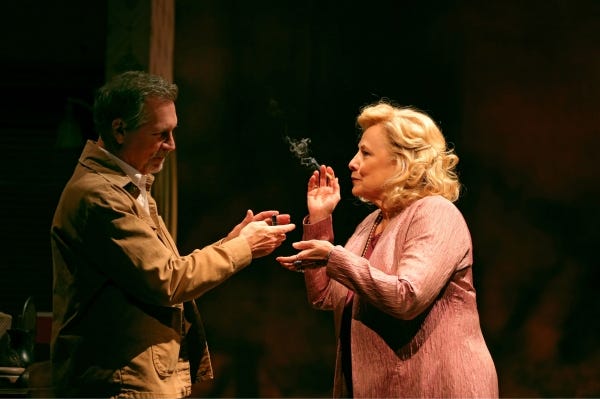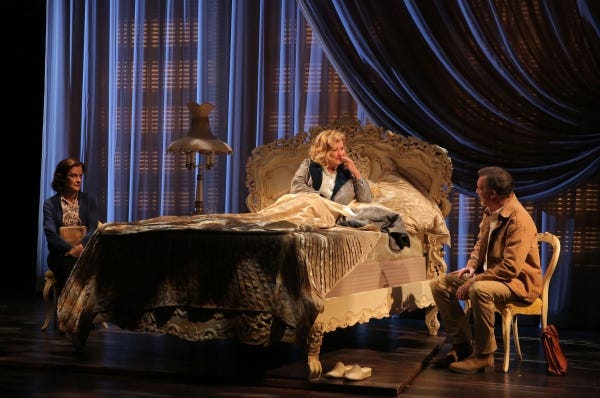Horton Foote's "The Old Friends."

Lois Smith and Hallie Foote.
Whatever else you may care to say about Horton Foote's The Old Friends, which is currently in previews at The Signature Theater, you can assert that the theatrical gauze--his persistent filter--through which he so frequently viewed his characters, has been peeled away. The scales, if you will, have fallen from his eyes. The characters in this play are purely and gloriously venal, solipsistic, drunk, and dessicated by both the Texas heat and their craven desires.
The play is a mess--some characters are never defined; hatreds are never explained or dramatized; there is more exposition on the stage than the smoke emitted from the many herbal cigarettes the cast members inhale; the style shifts frequently and swiftly. What the play has, needs, and fully utilizes is a gifted director (Michael Wilson) and a talented cast operating at a very high level.
Lois Smith, cast in a role that can be found in all of Foote's work, represents the past, the solid, decent witness to what the world once was and should always try to be; a woman perplexed by how fast things are moving, and moving downward. She loses a son, her home, and her bearings, but she manages, amazingly, to retain her dignity. In a part that could have easily been played as one of Country Simplicity, and bearing a trademark, Smith is wily and funny and frequently terrified. Her responses to the gallery of grotesques who parade through her home(s) and demand her hospitality, even as they berate and demean her, provide a constant and necessary commentary upon the characters with whom she shares a stage.

Cotter Smith and Betty Buckley.
Betty Buckley is Gertrude, imperious, prurient, shockingly blonde and brazenly sensual, festooned with jewels and grudges, and alcohol leads her to vent and confess her disappointments and her needs. There has always been a great actress beneath the remarkable singer that Buckley has deservedly become, and you see an example of the greatness here, and you dream of the parts to come and the parts missed. Her voice parched from the alcohol and the cigarettes and the Texas heat, Gertrude manages to pull herself together for another act of ruminative revenge, her many rings and brooches serving as reminders of her power and as weapons: She will not lose any battle she enters or begins. There are sad dreamers of all economic classes in small, dry towns, and Buckley presents a grand version: a Lady of the Camellias among the cactus; an Alexandra del Lago pinching boy ass at the country club; Miss Havisham, snacking on that moldy cake in her dark room. You cannot take your eyes off of her, even as she allows the character to degrade herself. When a character refers to her attempting to uproot some trees that she gave as a rare and grudging gift, you can imagine Buckley doing just that, and you laugh because she has given us such an indelible example of greed.
Hallie Foote is the revelation in the play, and this is not simply because she is the playwright's daughter, and the person perhaps most boldly motivated to see the works done well. Foote's sense of detail is extraordinary, and to watch her sift through a purse or sit quietly or listen to a pained recitative of Smith's matron is to witness a master class in acting. Foote is so subsumed in her character that it is at times painful to watch her move and breathe and try to keep living. Her character loses a husband, her money, and her identity, which she is trying to reclaim in a town and among people who are determined to keep her from finding or enjoying it, but she moves elegantly and gently toward some sense of deliverance. Arthur Penn once said that every piece by Horton Foote has within it a character who is the guiding star, a sort of nostrum by which the other characters should or might live. To watch this star, Penn believed, is to experience the purity from which Foote's plays emanated--a courtly, Southern decency, tinged by the exalted perception of Christian Science, that elevates humanity, allows it to dream, to matter, to survive. Hallie Foote is the play's guiding star, its pilgrim, if you will, and it is her journey you should take.

Hallie Foote, Betty Buckley, and Cotter Smith.
Michael Wilson has been given a set of glittering plates to juggle (including Adam LeFevre, Veanne Cox, who has never been better or more controlled, Cotter Smith, Novella Nelson), and he keeps them aloft and perfectly placed. If the play is often like Gertrude on one of her benders--bloated, unfocused, unclear, diffused--Wilson is the spine that keeps it upright so that we can see the good things, primarily the dark comedy that bleeds into the best melodramas.
I have no idea how The Old Friends sits on a page, but on a stage it is a necessary lesson in acting and directing, in making the best of things, in making something matter.


